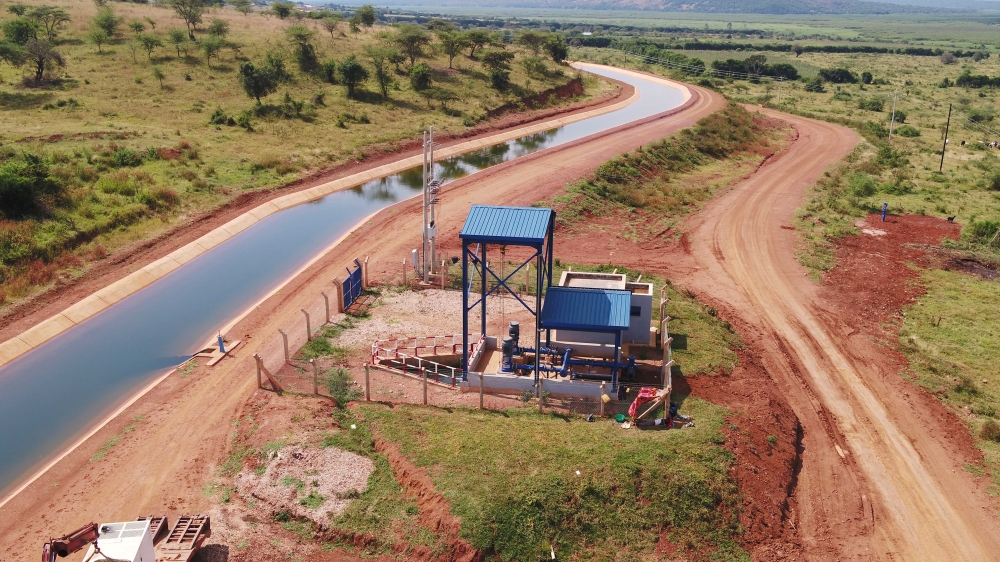Surbana Jurong subsidiary oversees first phase of Rwanda agribusiness hub
A 15,600 ha project aims to attract private investment in Rwanda’s agriculture sector
 Photo credit: Gabiro Agribusiness Hub
Photo credit: Gabiro Agribusiness Hub
Infrastructure consulting firm SMEC, a subsidiary of Singapore-based Surbana Jurong, has successfully overseen the completion of the first phase of the Gabiro Agribusiness Hub in eastern Rwanda. This ambitious project, a joint venture between the Government of Rwanda and Israeli irrigation company Netafim, aims to transform 15,600 ha of land into a commercial agricultural ecosystem, featuring advanced water infrastructure, irrigation systems, and agro-processing operations.
SMEC was responsible for project management and construction supervision of the first phase of the project, covering 5,600 ha. Over US$76m has been invested in this phase, which included the implementation of a modern drip irrigation system using water from the Akagera River. This technology, along with sprinklers and other techniques, maximises water use and optimises crop yields. Development work also included infrastructure upgrades such as pumping stations, lined canals, roads, and power lines.
Approximately 5,000 ha of land in the zone are available for lease to investors. The project aims to mitigate risks for private investment in the agriculture sector. Seven agricultural companies, including local players and investors from Romania, Kenya, and Zimbabwe, have already committed about US$40.4m to start operations in the zone. These investors plan to cultivate various crops, such as maize, soya beans, chilli, and macadamia. The hub is expected to create 4,000 jobs. Additionally, once completed, around 30% of the project’s land will be dedicated to community use, fostering economic opportunities for local farmers.
The Gabiro Agribusiness Hub is part of Rwanda’s efforts to modernise its agricultural sector, which faces challenges like limited water resources, outdated farming practices, and inadequate infrastructure. These issues hamper productivity, stifle economic growth, and jeopardise food security in rural areas.
The country's latest five-year agricultural strategic plan, running until the 2029 fiscal year, requires about US$5.3bn in investment. The government will contribute over US$2.5bn, or 47% of the total funding, while the remaining 53%, amounting to more than US$2.8bn, is expected from the private sector and grants. The plan targets new agriculture land management and production models, the promotion of urban farming, scaling up mechanisation, as well as modern inputs and labour-saving technologies. It seeks to boost local food security and increase agricultural export revenues from US$857m in 2023 to US$1.981bn.
References
‘7 firms to invest over Rwf50bn in Gabiro Agribusiness Hub’, The New Times, 02 February 2024
‘Time for Africa to stop praying for rain and back irrigation infrastructure’, The Africa Report, 29 May 2024
‘LinkedIn post’, Surbana Jurong Group, June 2024
‘Inside Rwanda’s Rwf7tn agriculture strategic plan’, The New Times, 24 June 2024
‘Gabiro Agribusiness Hub – Phase one completion: Pioneering sustainable agricultural solutions in Rwanda’, SMEC, 05 June 2024
‘Who we are’, Gabiro Agribusiness Hub, Accessed 26 July 2024
‘Revolutionizing rural agriculture in Eastern Rwanda’, SMEC, Accessed 26 July 2024
‘Land lease’, Gabiro Agribusiness Hub, Accessed 26 July 2024
‘Gabiro Agribusiness Hub’, Gabiro Agribusiness Hub, Accessed 26 July 2024














/enri-thumbnails/careeropportunities1f0caf1c-a12d-479c-be7c-3c04e085c617.tmb-mega-menu.jpg?Culture=en&sfvrsn=d7261e3b_1)

/cradle-thumbnails/research-capabilities1516d0ba63aa44f0b4ee77a8c05263b2.tmb-mega-menu.jpg?Culture=en&sfvrsn=1bc94f8_1)

7e6fdc03-9018-4d08-9a98-8a21acbc37ba.tmb-mega-menu.jpg?Culture=en&sfvrsn=7deaf618_1)







